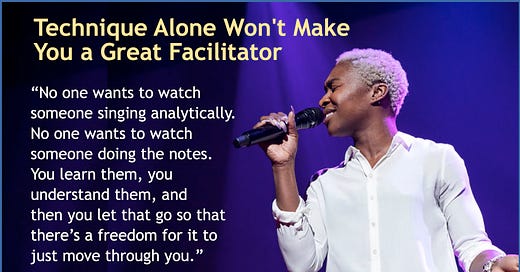Technique Alone Won't Make You a Great Facilitator (Facilitation Friday #22)
Trying on techniques to facilitate better is desirable, but ultimately you have to tailor them for a custom fit.
When technique rings hollow: a case study
We were about halfway through the facilitation workshop. Participants were practicing the core skills we had explored, facilitating various small group conversations. As I observed one very earnest young man in action, something felt off. The questions he used and the gestures he made were too studied … too rehearsed … too textbook. You could see his analytical work; there was no freedom for the techniques to just move through him, to quote Cynthia Erivo.
During the debriefing, I asked him to talk about how he felt about his practice efforts. He spoke enthusiastically about incorporating many of the techniques and mannerisms he had seen his mentors and other effective facilitators use when leading groups.
It became clear to me that the discomfort I felt while observing him was because his facilitation was not entirely of his own doing. It instead reflected loose-knit impersonations of those he apparently channeled. This is not unusual: we see something that works and we try to copy it.
In our effort to embrace what we have learned from mentors or role models, we may appropriate some of their speech, their actions, or their thoughts and then proffer them as our own. This right-hearted (but somewhat wrong-headed) approach can cause our interactions with others to feel hollow.
The same can happen when we discover a new model, framework, tool, or technique. I still remember the thrill of learning about “I statements” as a young residence hall professional, but also the robotic tone of my initial efforts to use them.
This dynamic reminds me of a vocal master class taught by 2011 Kennedy Center honoree, the legendary Barbara Cook. She wisely notes that being present and authentic in the moment, not immediately turning to technique, can feel dangerous, but “this very thing that seems dangerous is where safety lies.”
Reflecting and journaling: one way to move beyond just technique
Without a doubt, we should reflect on (and learn from) the wisdom of others and our observations of effective facilitators in action. But ultimately we have to develop our own voices as individuals, as facilitators, as leaders. And perhaps the best way to do so is simply to let our voice speak, to listen to it with great intention, and to make as much meaning of it and our choices as we are equipped to do at any particular point in our lives.
For many years I’ve kept journals for different types of sessions I facilitate: strategy, retreats, conflict resolution, idea generation, facilitation trainings, et al. After a session, I reflect on the experience and note thoughts about what worked, what didn’t, what did or did not happen as I expected, and what I felt or thought during any key moments. I contemplate what I can learn from whenever I felt most pressured to rely on a tool or technique instead of simply being present and responding authentically. I also consider the alignment of my efforts with the core values I want associated with my facilitation.
When preparing for subsequent engagements, I return to the appropriate thematic journal to see how my thinking and facilitating have evolved over time. Doing so helps me consider how to better ensure that this next effort fully reflects my identity and integrity, as well as the deeper range of experience and understanding I want to bring to bear.
Bottom line?
No single "correct" facilitation style exists other than the one that most reflects your authenticity, your humanness. That is the most important tool we bring to any meetings, workshops, or conversations we facilitate.
We shouldn't turn facilitation into performance art, becoming the character of The Facilitator. Instead we must simply bring our personal character to whatever facilitation work we are called to do. As Ken Burns aptly notes, “Style is the authentic application of technique.” Trying on techniques to facilitate better is desirable, but ultimately you have to tailor them for a custom fit.
Getting in Action
Here is an 18-minute video of Cook’s mentoring session with young performers. Watching her help them focus less on technique and performance and more on authenticity and connection resonates with me deeply.
I encourage you to watch this clip and then use the one-page worksheet (PDF) to get in action. It excerpts some key quotes from the video and includes a few reflection questions to help you think about how you might bring more of your self to your facilitation efforts.
© Facilitate Better and Jeffrey Cufaude. All rights reserved.
To affordably license this content for reprint on your site or in electronic or print communications or to contact me regarding customized facilitation skills workshops or consultations, complete this form.







